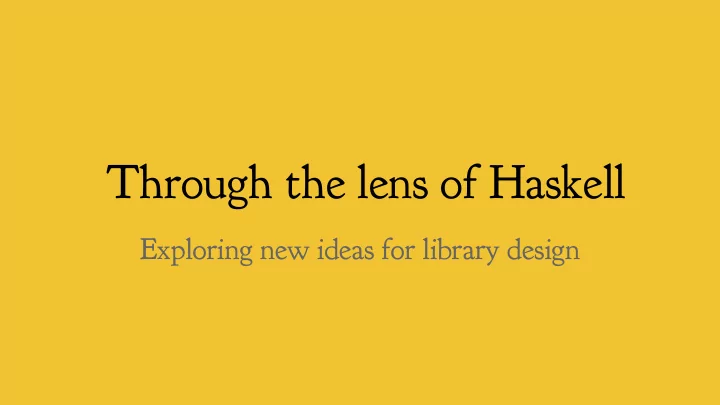

Through the lens of Haskell Exploring new ideas for library design
@georgesdubus
Haskell, the language
Haskell, the ecosystem
Design space
There should be one — and preferably only one — obvious way to do it. (Python)
There should be one — and preferably only one — obvious way to do it. (Python) Let’s keep looking for it! (Haskell)
Some Haskell libraries
JSON Packaging HTTP
JSON ??? ??? Packaging HTTP ???
Some Haskell libraries Part 1: attoparsec
“Real life” use case : A slack bot that answers movie quotes
subtitleParser Name Type Full package definition
subtitleParser All I need
attoparsec All I need to know : parseOnly :: Parser Subtitles -> ByteString -> Either ErrorMessage Subtitles
attoparsec All I need to know : parseOnly :: Parser Subtitles -> ByteString -> Either ErrorMessage Subtitles parseOnly :: Parser a -> ByteString -> Either ErrorMessage a
attoparsec Or : incremental parsing parse :: Parser a -> ByteString -> Result a feed :: Result a -> ByteString -> Result a (Result can be Partial, Failed or Done)
attoparsec Part of a bigger parser many :: Parser a -> Parser [a] or :: Parser a -> Parser b -> Parser (Either a b)
Parsers everywhere parseCSV :: Parser CSV in attoparsec-csv json :: Parser JSONValue in aeson crontab :: Parser Crontab in cron emailAddress :: Parser String in email-header toml :: Parser TOMLValue in toml ...
A good library simplifies the implementation
A good library simplifies the interface
General solution Specific building blocks
attoparsec General solution Specific building blocks all parsers
Some Haskell libraries Part 2: conduit
Conduit Streaming library Producers Consumers Conduits that both consume and produce
Lot of libraries sourceSocket socket =$= ungzip =$= sinkFile "/tmp/output" producer from Data.Conduit.Network conduit from Data.Conduit.Zlib consumer from Data.Conduit.Binary
conduit + attoparsec = � Parser ➡ Conduit sourceFile “something.srt” =$= conduitParser parseSubtitleLine =$= ircConsumer Parser of Subtitle Lines High-performance subtitles streaming for free !
conduit General solution Specific building blocks all conduits
Some Haskell libraries Part 3: lens
Data manipulation BlogPost { title = “Made-up examples considered harmful” , author = Person {name=“Alice”} , comments = [ Comment { author = “Bob” , content = “Great insight!” } , Comment { author = “Carol” , content = “I completely disagree” } ] }
Getters Lens >>> view title blogpost “Made-up examples considered harmful”
Getters Lens Lens Lens >>> view title blogpost >>> view (author . name) blogpost “Made-up examples considered harmful” "Alice"
Getters Lens Lens Lens >>> view title blogpost >>> view (author . name) blogpost “Made-up examples considered harmful” "Alice" Setters >>> set (speaker . name) “Alicia” blogpost BlogPost { title = “Made-up examples considered harmful” , author = “Alicia” , ... }
Getters/setters with multiple values ?!? Lens Traversal Lens >>> toListOf (comments . each . author) blogpost [“Bob”, “Carol”]
Getter / setter pairs are values >>> let commentContents = comments . each . content >>> toListOf commentContents blogpost [“Great insight!”, “I completely disagree”] >>> set commentContents “Blah blah blah” blogpost BlogPost { comments = [ Comment { author = “Bob” , content = “Blah blah blah” } , Comment { author = “Carol” , content = “Blah blah blah” } ] , ... }
Libraries provide lenses: JSON [{“id”: “1”, “name”: “georges”}, {“id”: “2”, “name”: “lucie”}] >>> input & (values . key “name”) %~ capitalize [{“id”: “1”, “name”: “Georges”}, {“id”: “2”, “name”: “Lucie”}]
Libraries provide lenses: HTML titles = allNamed (only "h2") . contents Traversal into all tags with a given name Their content
lens General solution Specific building blocks all lenses
“Borrowing” ideas
Python ➡ Haskell wreq = requests + lens
Haskell ➡ Python hypothesis
Conclusion
Explore the design space
Explore the design space Factorize library interfaces
Explore the design space Factorize library interfaces Bonus : DIY conclusion
Recommend
More recommend